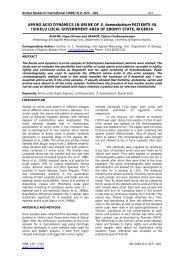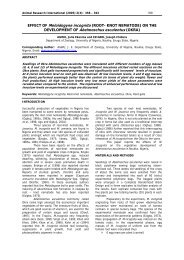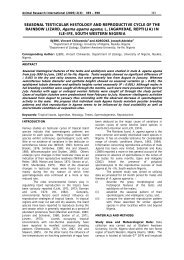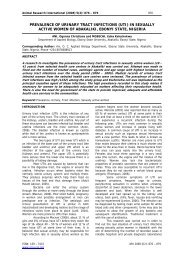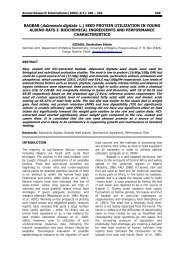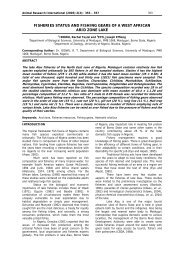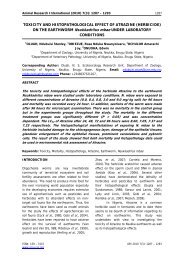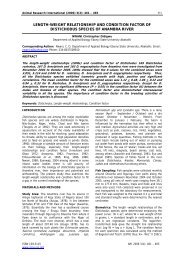Animal Research International (2005) 2(1): 255 – 260 255PARASITIC DISEASES AND SEXUAL DISABILITY: A CRITICAL REVIEW OFSOME PARASITIC DISEASES WITH SERIOUS SEXUAL REPERCUSSIONS1 OKAFOR, Fabian Chukwuemenam and 2 OMUDU, Edward Agbo1 Department of <strong>Zoo</strong>logy, University of Nigeria, Nsukka2 Department of Biological Sciences, Benue State University, MakurdiCorresponding Author: OMUDU, E. A. Department of Biological Sciences, Benue State University,MakurdiABSTRACTA wide range of parasitic diseases even though not sexually transmitted, invade male andfemale reproductive <strong>org</strong>ans causing direct pathological damages leading to impaired fertilityand sexual dysfunction. This paper provides a framework for thinking about the psychologicalimpact and burden o f these parasitic infections. It begins by providing the etiology of thesediseases and a brief overview of the socio-cultural and psychological implications of infectedand affected individuals. The article concludes with reflections as to how interactions o fparasitological and anthropological factors produce multi-dimensional reproductive healthproblems requiring urgent multi-disciplinary investigation and intervention.Keywords: Parasitic infection, Sexual repercussionINTRODUCTIONA range of parasitic diseases has differentreproductive health consequences for men andwomen. Parasites may affect sex and/or sexual<strong>org</strong>ans in two ways: the infecting <strong>org</strong>anism mayproduce sufficient debilitation or anatomicdeformities to make sex impossible as inonchocercrasis and lymphatic filariasis or maycause direct damage to male and femalereproductive <strong>org</strong>ans impairing fertility as a result ofinhibition of gamete production as intrichomoniasis, schistosomiasis and toxoplasmosis.Of the vast array of parasitic diseases endemic inNigeria, only trichomoniasis caused by theprotozoan parasite Trichomonas vaginalis is knownto be sexually transmitted. A wide range of otherparasitic diseases, even though not sexuallytransmitted, may however invade male and femalereproductive <strong>org</strong>ans causing direct pathologicaldamages leading to impaired fertility and sexualdisability (Burrow and Ferris, 1975; Hartigan,1999; Omudu and Amali, 2003).Other parasitic diseases may not directlyaffect reproductive <strong>org</strong>ans but their variouspathological manifestations may resemble diseasesgenerally believed to be sexually transmitted withits attendant stigma. It is often the stigma thatexacerbates the medical and psychologicalburdens of infected and/or affected individuals.Genital symptoms and manifestations of a varietyof protozoan and helminthic infections which arenot usually sexually transmitted may mimic classicsexually transmitted infections by producingulceration (for example, amoebiasis,leishmaniasis), wart-like lesions (schistosomiasis),or lesions of the upper genital tract as a result ofamoebiasis and schistosomiasis.Richens (2004) reported a variety of othergenital symptoms less suggestive of SexuallyTransmitted Diseases (STDs), these includehydrocele (seen with filariasis) and haemospermia(seen with schistosomiasis). Considering thepathological damage to sex <strong>org</strong>ans and the socialand psychological burden borne by affected andinfected individuals, there is urgent need to focusspecific attention on their clinical presentation withthe aim of providing holistic management andintervention.Schistosomiasis for instance, though notsexually transmitted, has been reported to haveserious sexual implications when the eggs invadetissues lining the reproductive <strong>org</strong>an causinganatomic deformities enough to reduce sexualpleasure for both partners (Hartigan,1999;Hanson, 1999; TDR News 1996). Female GenitalSchistosomiasis (FGS), as it is commonly referredto, has also been associated with a range ofpathologies including infertility, abortion andectopic pregnancy (WHO, 1998). Mondaini et al(2004) reported cases of testicular pains resultingfrom parasitic infection, especially among nonimmunedindividuals who have visited endemiccountries. Though they maintained that scrotalswelling may not be a specific diagnosis forfilariasis, it may however be a pointer to genitalfilariasis.The main focus of this paper is to discussthe sexual implications of some parasitic diseasesand how socio- cultural beliefs combine withparasitological manifestations to make life awretched existence for infected and/or affectedindividuals. It is hoped that medical experts will
OKAFOR, Fabian Chukwuemenam and OMUDU, Edward Agbo 256begin to address some of these socio-culturalbeliefs when developing intervention strategiesrather than focusing only on the biologicalmechanism through which these diseases operate.SOME PARASITIC DISEASES WITH SEXUALREPERCUSSIONSOnchocerciasis: Onchocerciasis, or riverblindness is caused by a filarial parasiteOnchocerca volvulus and transmitted by the bitesof blackfly Simulium species. This disease is ratedas a leading cause of blindness and about 20million people are infected worldwide while onemillion of those infected are totally or partiallyblind (Edungbola and Parakoyi, 1991).Onchocerciasis can manifest in several dramaticand bizarre forms with an incredible adverseimpact on agriculture, demography and socioeconomicconditions. It causes extensive skindisfiguration with unbearable discomfort. However,its most dreadful and terminal complication isblindness.Besides blindness, hernias, leopard skin,hanging groins and elephantiasis have beenidentified as important complications ofonchocerciasis in areas where the disease isendemic (Edungbola et al., 1991). While theassociation between hanging groins and herniashas been reported (Williams and Williams, 1966) ithas been established that hernia is a definite andmajor complication of onchocerciais (Nelson 1958,Edungbola et al., 1991).The medical and socio-economicseriousness of these complications ofonchocerciasis such as hernias, elephantiasis,hanging groins are often associated with sexualdisability because of the severe enlargement of<strong>org</strong>ans and disfiguration. Scrotal elephantiasis andhernias constitute formidable psychological burdenfor infected individuals as a result of obvioussexual repercussions. Partner desertion andabandonment often characterize such situations.In addition to the sexual incapacitation, scrotalelephantiasis and hernias also lower theproductivity and wage earning capacity of thoseafflicted.Gender roles also influence theconsequences of these manifestations ofonchocerciasis (Hartigan,1999, Harnson, 1999).For example masculinity is often demonstratedthrough multiple sexual conquests and control ofresources. Men who develop scrotal elephantiasis,hernia or hanging groins find it very difficult, if notimpossible, to engage in sexual intercourse inaddition to lower productivity. Women, on theother hand depend more on their physicalappearance to enhance their prospects formarriage and sustaining a relationship with malepartners, developing any of these onchocercalmanifestations jeopardise these aspirations.The skin manifestations in onchocerciasisare characterised by severe dermatitis and itching,the thickening and atrophy of skin and pigmentaryaberrations. Obikeze (1992) reported that thesepigmentary aberration (onchodermatitis) has verygrave social, economic and psychologicalimplications for victims of onchocerciasis. Youngwomen and men with the disease arediscriminated against, humiliated by peers,avoided by friends and stigmatized by society.Married women with onchodermatitis lose theaffection of their husbands while marriage chancesof infected persons are adversely affected, if nottotally ruined. Psychologically, onchodermatitisengenders withdrawal behaviour, isolationism andsocietal maladjustment on the part of the affectedindividual.Ovuga et al. (1995) investigated someaspects of social anthropological implications ofonchocercal skin disease in Nebbi district inUganda. Results indicated that onchocerciasis wasconsidered to be mysterious disease, especially thedermal manifestations of lizard and leopard skin.The disease was often mistaken for measles andleprosy and as such affected individuals sufferedfrom discriminatory practices applied on sufferersof measles and leprosy. The belief systems of thecommunity were said to be responsible for thediscriminatory practices of the people againstthose affected by onchocercal skin diseases.Persons who had these skin conditions rankedseparation from spouses as the most painfulaspect of the stigma.Lymphatic Filariasis: Lymphatic filariasis iscaused by the filarial nematode Wuchereriabancrofti and transmitted by the bites of Culexmosquito species. Although the disease caused bythis parasite is rarely fatal, the morbidity due tothe disease is high due to lymphoedema andhydrocoele which are results of impairment inlymphatic drainage. The socio-economicimplications of this disease include social isolationor stigma in reaction to the enlarged limbs orhydrocoel (WHO 1998).It is estimated that 40 million peoplesuffer from the chronic, disfiguring manifestationsof this disease, including 27 million men withtesticular hydrocoele, lymph scrotum orelephantiasis of the scrotum (Dreyer et al. 1997).An estimated 13 million people, the majority ofwhich are women have filarial-associatedlymphoedema or elephantiasis of the leg, arm orbreast (WHO 1998). Although lymphatic filariasis isranked as the second leading known cause ofdisability worldwide (WHO 1998) little attentionhas been paid to the important but hidden
- Page 1 and 2: Animal ResearchInternational ®Anim
- Page 4 and 5: Influence of dietary protein conten
- Page 7 and 8: MGBENKA, Bernard Obialo et al. 216T
- Page 9 and 10: MGBENKA, Bernard Obialo et al. 218(
- Page 11 and 12: EKWUNIFE, Chinyelu Angela 220repeat
- Page 13 and 14: EKWUNIFE, Chinyelu Angela 222Table
- Page 15 and 16: Animal Research International (2005
- Page 17 and 18: ORJI, Raphael Christopher Agamadoda
- Page 19 and 20: OGUGUA Victor Nwadiogbu and IKEJIAK
- Page 21 and 22: OGUGUA Victor Nwadiogbu and IKEJIAK
- Page 23 and 24: OLUAH, Ndubuisi Stanley et al. 232G
- Page 25 and 26: OLUAH, Ndubuisi Stanley et al. 234C
- Page 27 and 28: ATAMA, Chinedu and MGBENKA, Bernard
- Page 29 and 30: ATAMA, Chinedu and MGBENKA, Bernard
- Page 31 and 32: Animal Research International (2005
- Page 33 and 34: EZEAGU, Ikechukwu Edwin 242Table 1:
- Page 35 and 36: EZEAGU, Ikechukwu Edwin 244Table 5:
- Page 37 and 38: Animal Research International (2005
- Page 39 and 40: 248Table 1: Percentage (%) mean cru
- Page 41 and 42: 250breakdown proteins into peptones
- Page 43 and 44: Animal Research International (2005
- Page 45: OKAFOR, Anthony Ikechukwu and CHUKW
- Page 49 and 50: OKAFOR, Fabian Chukwuemenam and OMU
- Page 51 and 52: OKAFOR, Fabian Chukwuemenam and OMU
- Page 53 and 54: OTITOJU Olawale and ONWURAH Ikechuk
- Page 55 and 56: OTITOJU Olawale and ONWURAH Ikechuk
- Page 57 and 58: OTITOJU Olawale and ONWURAH Ikechuk
- Page 59 and 60: UCHEWA, Emmanuel Nwafoagu et al. 26
- Page 61 and 62: UCHEWA, Emmanuel Nwafoagu et al. 27
- Page 63 and 64: UCHEWA, Emmanuel Nwafoagu et al. 27
- Page 65 and 66: UCHEWA, Emmanuel Nwafoagu et al. 27
- Page 67 and 68: EYO, Joseph Effiong 276Karyotype ev
- Page 69 and 70: EYO, Joseph Effiong 278MATERIALS AN
- Page 71 and 72: EYO, Joseph Effiong 280Based on the
- Page 73 and 74: EYO, Joseph Effiong 28210Figure 7:
- Page 75 and 76: EYO, Joseph Effiong 284Relative chr
- Page 77 and 78: EYO, Joseph Effiong 286Cyprinidae,



